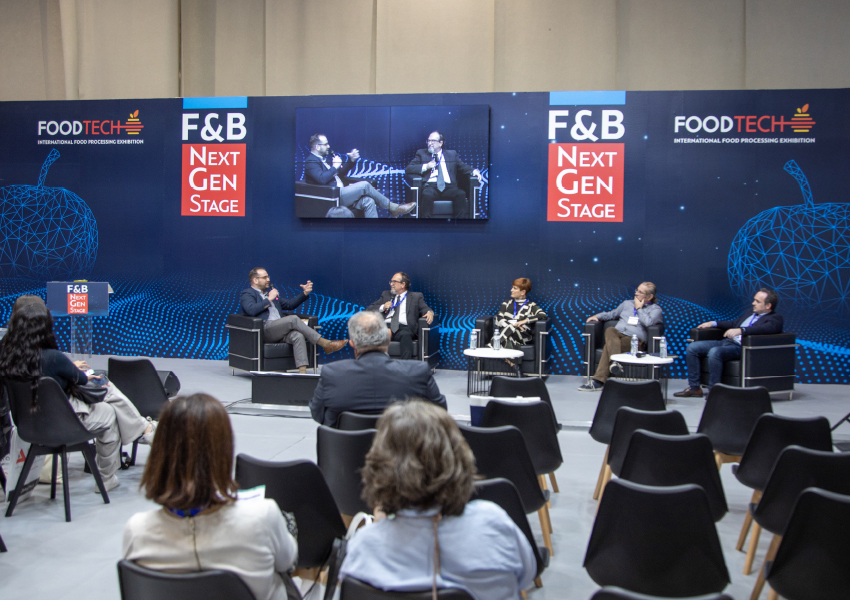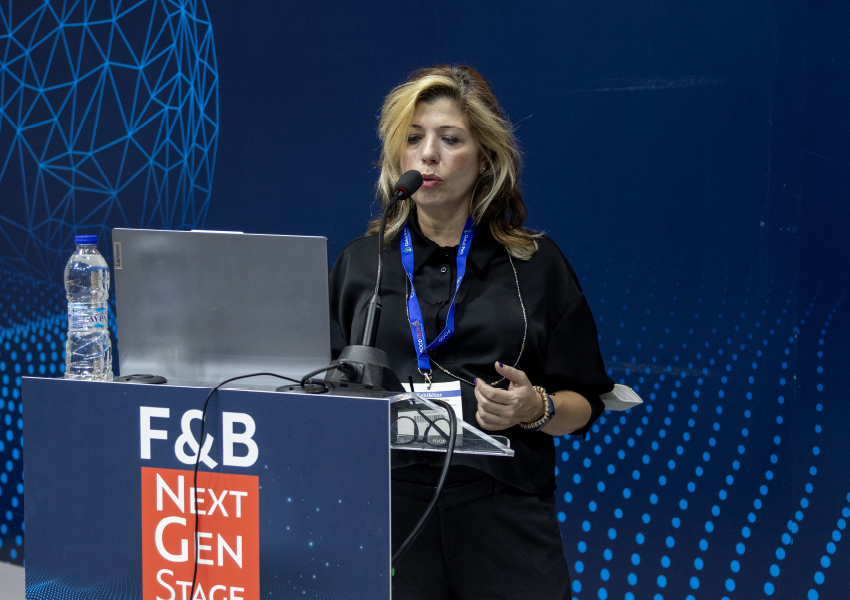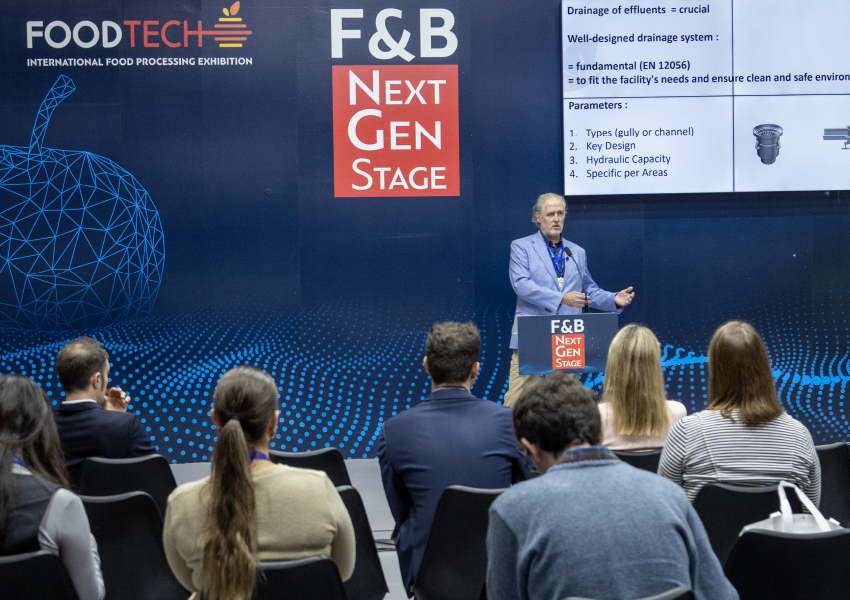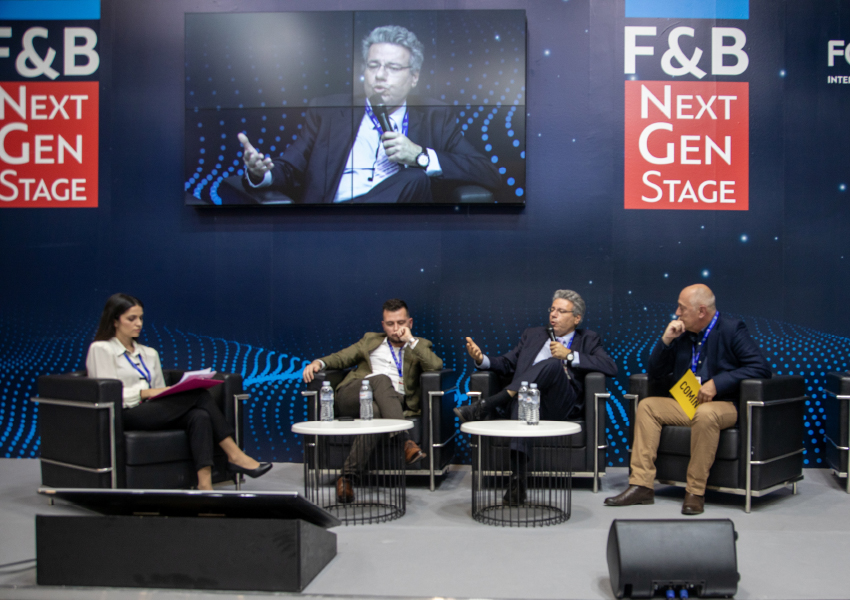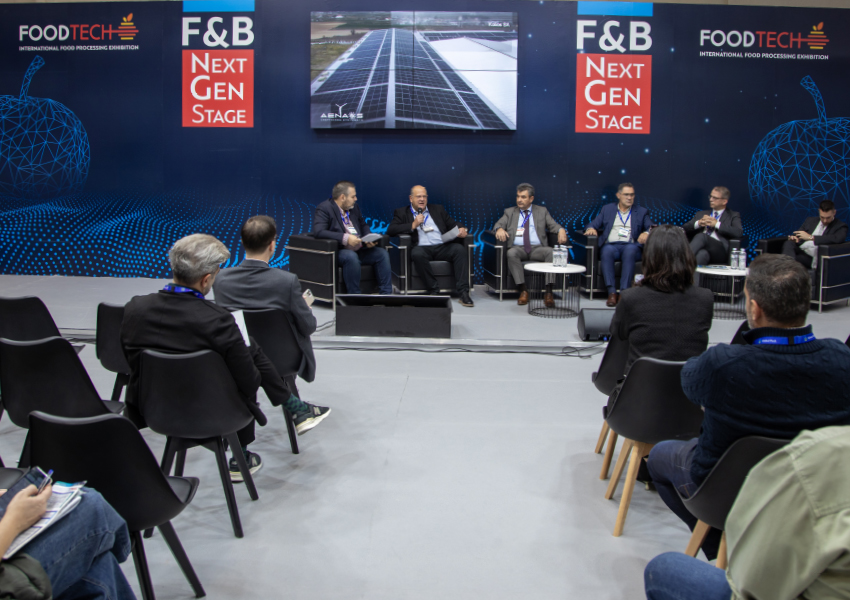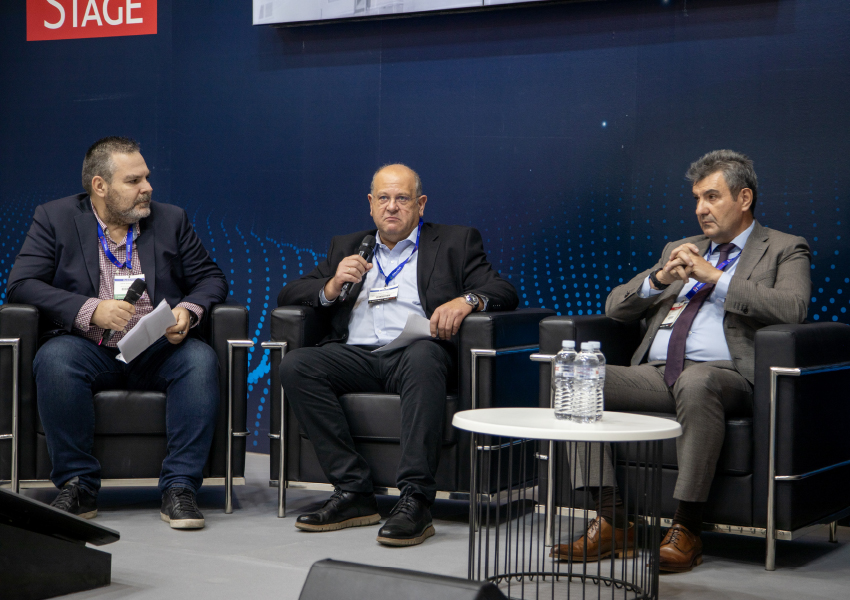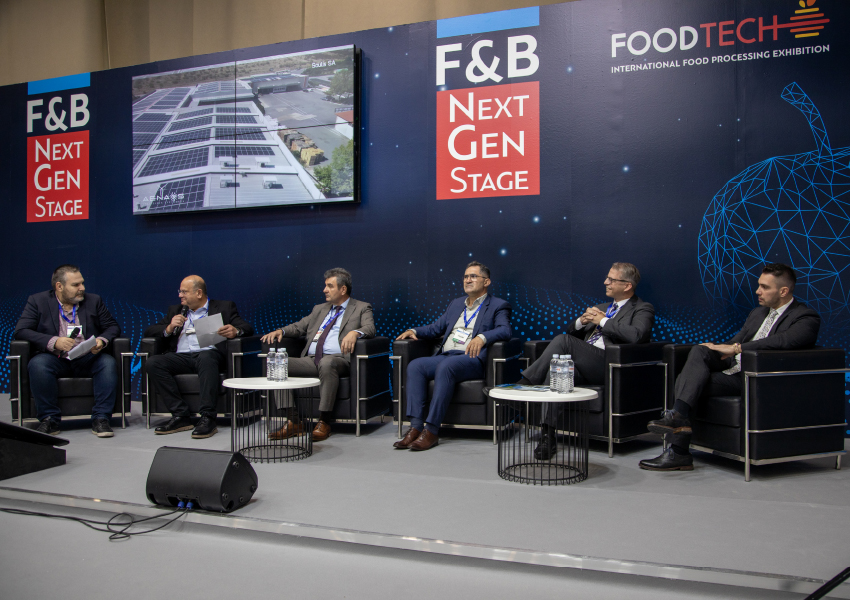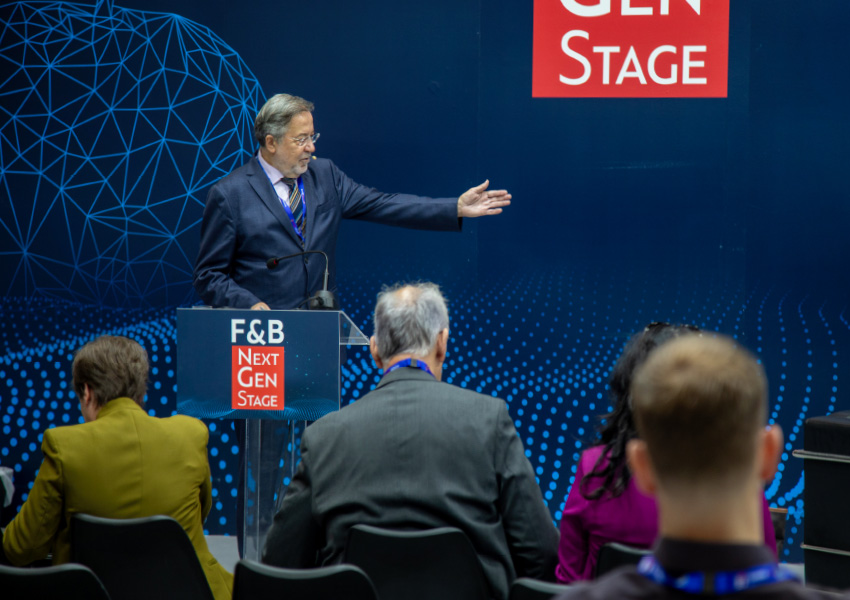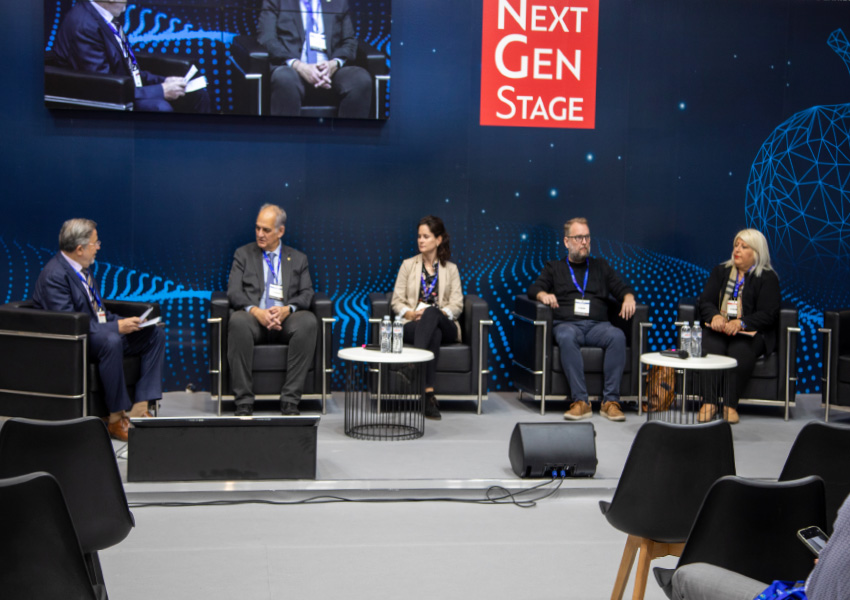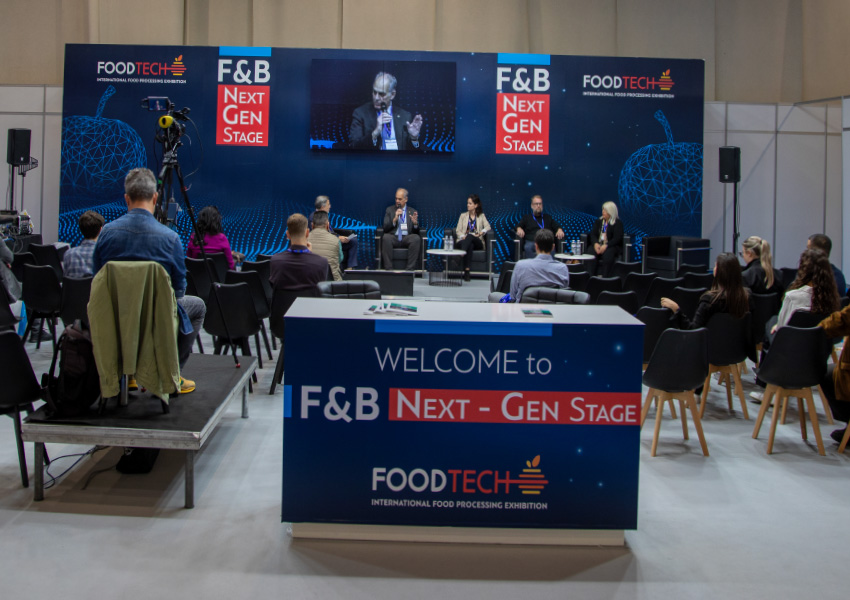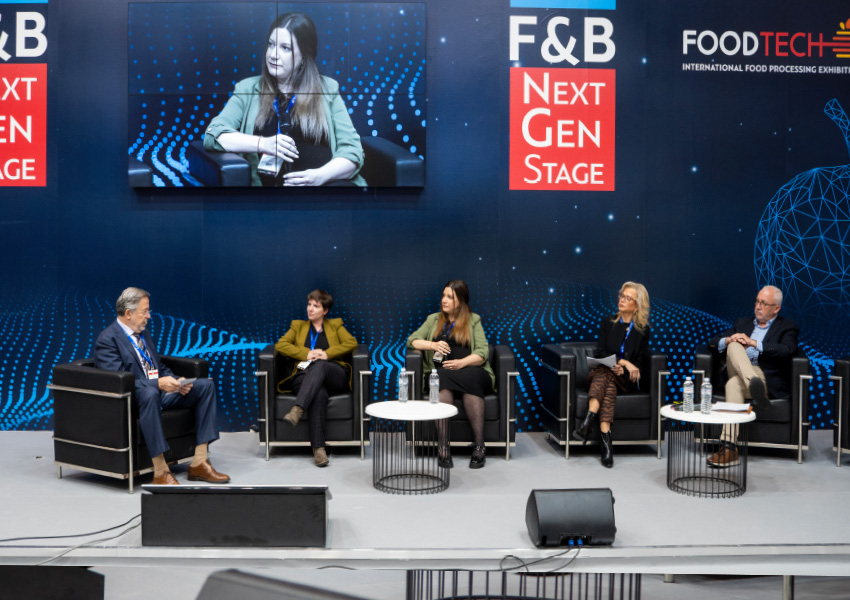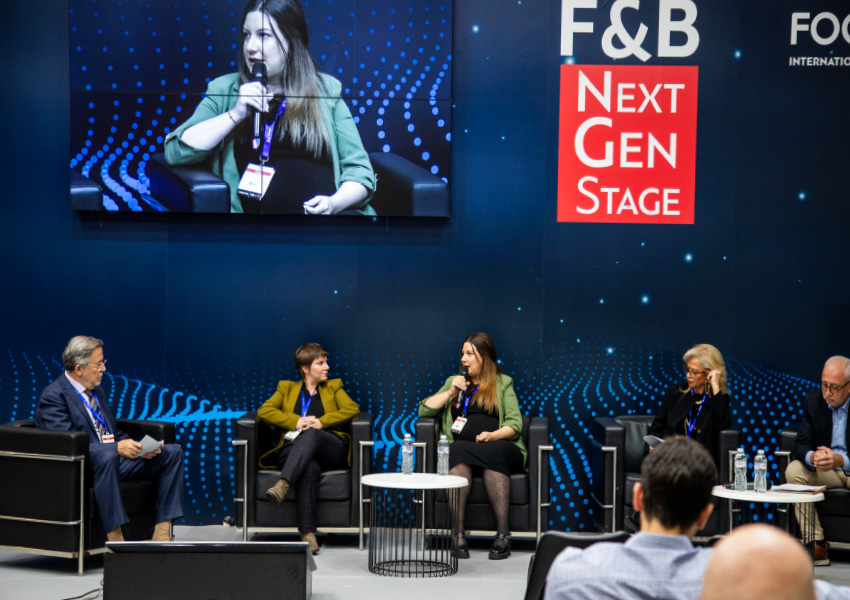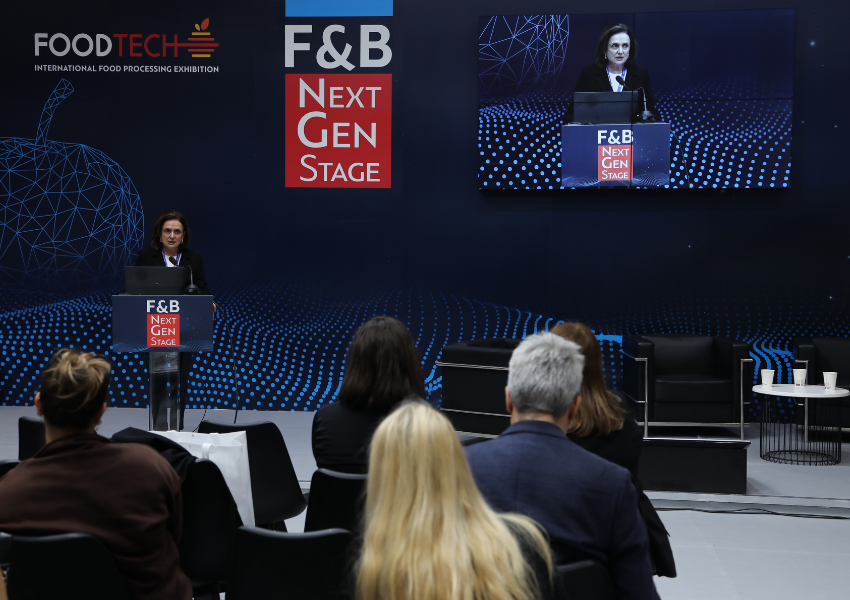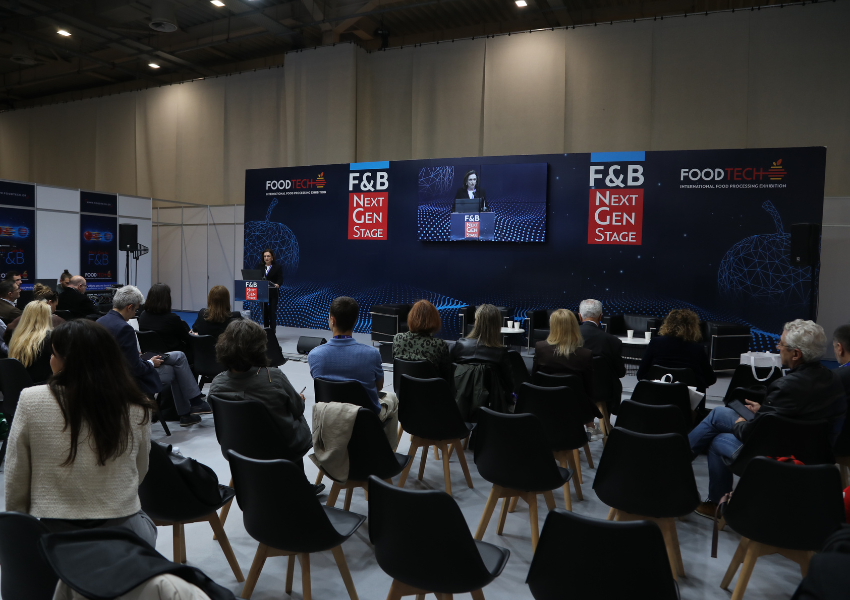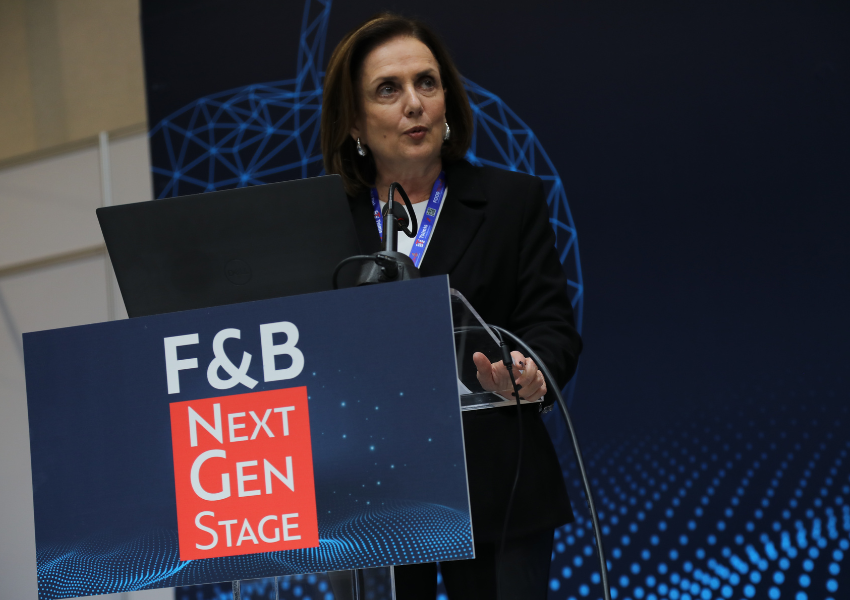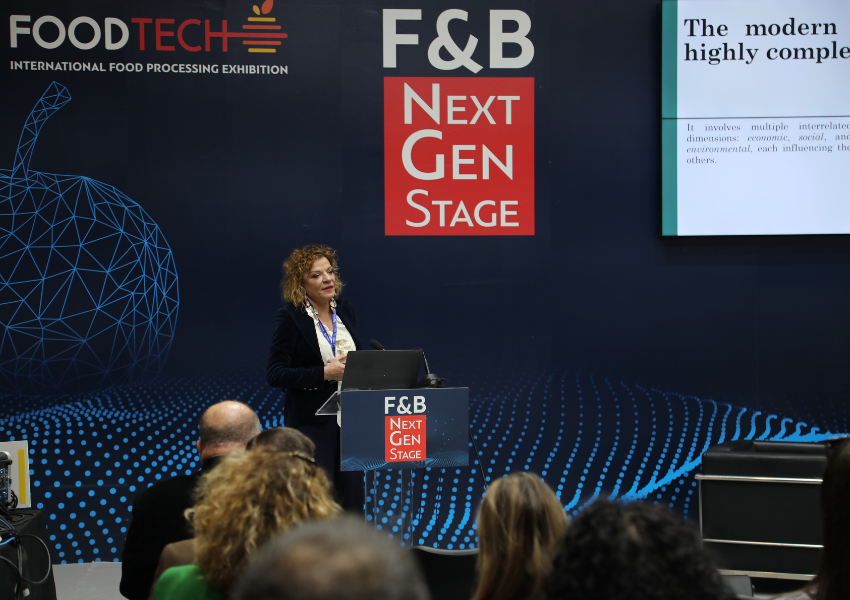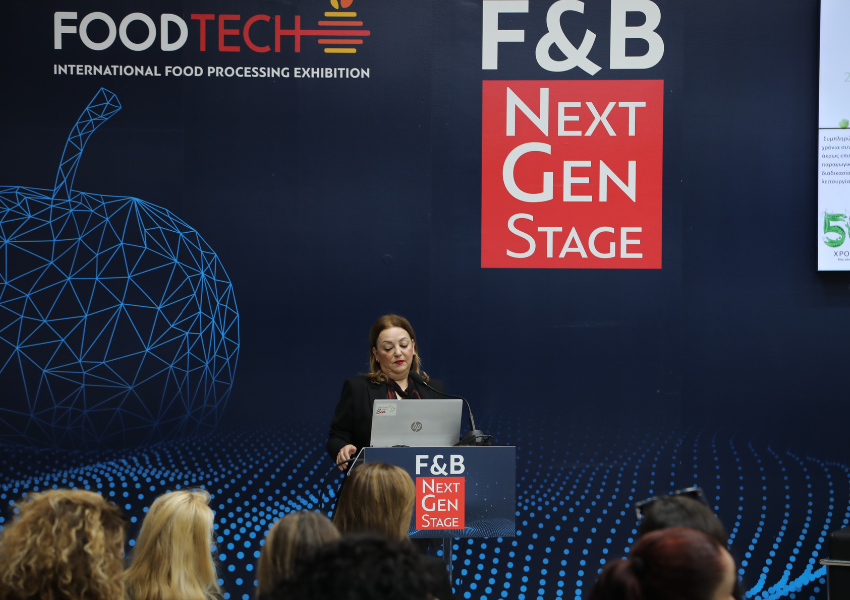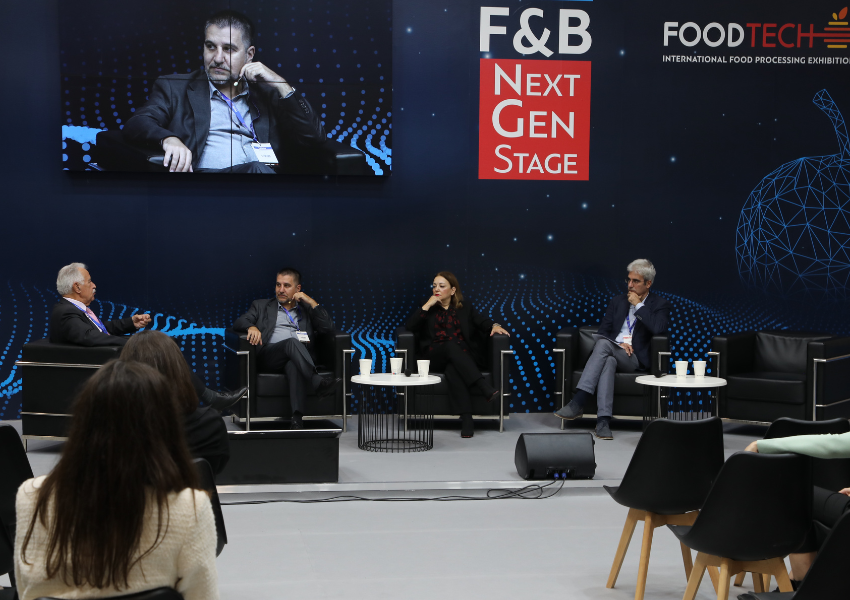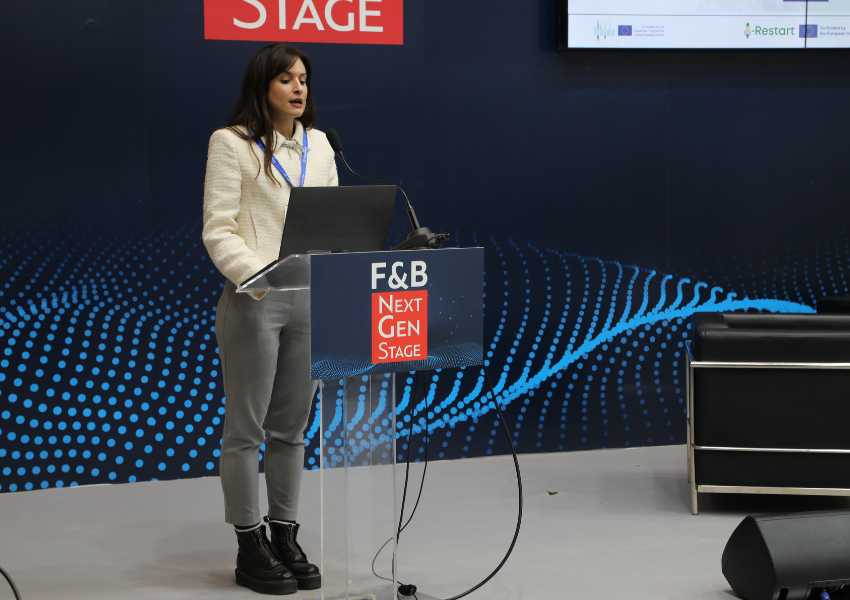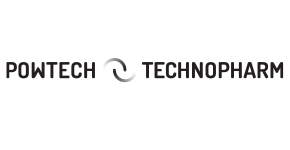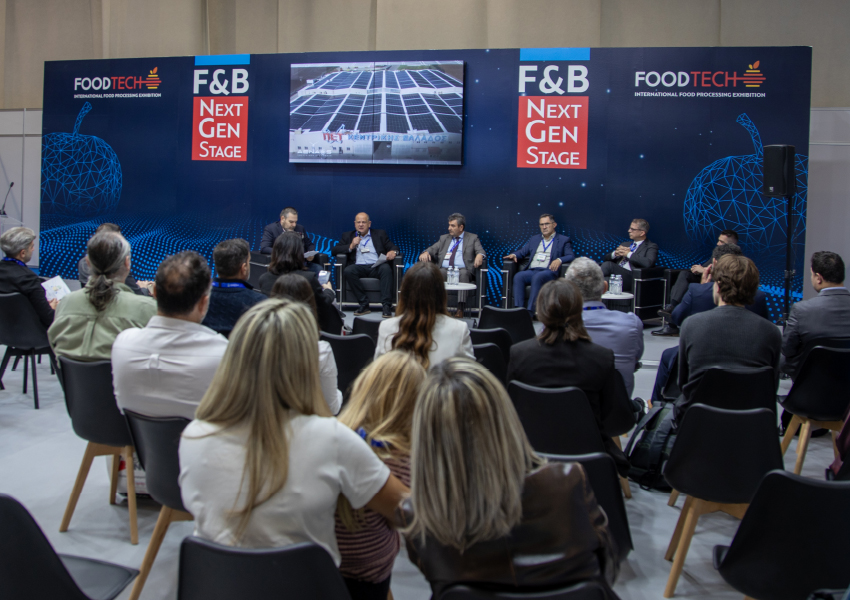
FOODTECH 2025: Innovation, Sustainability and Technology in the Service of Food and Beverage
FOODTECH 2025 brought to the forefront innovation, sustainability, and technology in the food and beverage industry over four days. A premier gathering of knowledge and progress featuring thematic labs, panels, and success stories shaping the future of the sector.
Trends & Innovation Artificial Intelligence, Food Safety, Challenges and Innovations
The future of food safety, innovations, and the role of artificial intelligence were the central themes of the Trends & Innovation session held at the FnB Next Gen Stage during FOODTECH.
The discussion was moderated by Mr. Yiannis Oikonomou, Manager of the communications company NUTHESIA E.E. He first gave the floor to Ms. Vicky Krystallidou, Head of the Innovation and Strategy Hub of the Mediterranean Agrifood Competence Center (MACC), who highlighted two major challenges: the inability of young livestock farmers to adopt new technologies due to high costs, and the need to bridge communication between academics and producers to fully leverage the knowledge these technologies offer.
Next, Professor Panagiotis Skandamis from the Agricultural University of Athens spoke about the “Growth Predictor” and its ability to accurately forecast food shelf life using a dedicated app. Commenting on the realistic application of AI across sectors in Greece, he emphasized that adopting it is a necessary path to remain competitive against large companies that have already embraced it.
Mr. Vangelis Vlachos, CEO of ZEN DIGITAL GROUP, discussed dynamic QR codes, FNCs, and the tools they offer to producers and consumers, enabling product tracking and providing essential after-data for development and improvement.
Finally, Mr. Dimitris Stamoulakis, founder of Word Emporio, stressed the importance of utilizing natural raw materials and educating consumers to recognize the unique characteristics of new products.
Dairy Lab Innovation in Dairy Production
Innovations and the steps needed to support Greek dairy production were the focus of the Dairy Lab session, held at the FnB Next Gen Stage during FOODTECH.
The session was moderated by Mr. Giorgos Oikonomou, Economist and Expert in Agrifood Sector issues. It began with Professor Efi Tsakalidou from the Department of Food Science and Human Nutrition at the Agricultural University of Athens, who discussed innovation fields involving both current and emerging technologies. These technologies allow us to understand the type, quality, and safety of products, as well as their impact on human health and sustainability.
Mr. Christos Apostolopoulos, President of the Board of the Association of Dairy Industry (SEVGAP), emphasized the urgent need to protect feta and Greek yogurt. He noted that to eliminate foreign imitations—currently dominating the global market—we must register all products under the “Greek Yogurt” label.
Entrepreneur and President of Cheesemakers of Chania, Mr. Spyros Balantinos, focused on Cretan cheesemaking and its challenges, such as the weak global presence of its products. He also highlighted efforts to restructure the sector and promote Cretan cheeses, olive oil, and honey.
Lastly, Ms. Eirini Schina, Biologist and Technical Sales Executive at TFT Lab Equipment, presented new technologies that ensure safety and consistent quality in dairy products through real-time chemical analysis during production.
Sustainability and innovation at the heart of the discussions
On Saturday, November 8, many engaging talks focusing on sustainability and innovation took center stage at the F&B NEXT-GEN STAGE, held at Foodtech in Hall 2. The series of presentations was opened by Herwig Nollet (Sales Manager, Polysto Group CEE, Balkan, Baltics, IL, ZA/ZW) with the topic “Hygienic Design Principles of Food Factories,” supported by Flanders Investment & Trade (the Trade Department of Flanders at the Embassy of Belgium).
He began with a brief introduction to the European Hygienic Engineering & Design Group, emphasizing three key points: the market, the benefits, and the construction aspect. He also highlighted the core motto of hygienic design: “If you can’t see it, if you can’t reach it, you can’t clean it.”
Special mention was made of the main factors of hygienic design, including the construction site, building design, internal components, building materials, equipment, services, cleanliness assurance, as well as testing and certification. On the practical side, he presented a plan for how to map out a factory and create a comprehensive design, pointing out key focus areas such as walls, floors, covings, stainless steel pillars and barriers, hygienic LED lighting, and stainless steel drainage systems.
He concluded by analyzing the key focus areas of the Polysto Group, which include ceilings, joints, walls, curbs, drains, roofs, and barriers, stressing that their goal is to minimize two critical variables to prevent the growth of harmful and potentially deadly bacteria.
Next, Anastasia Kolombotsou (Dietitian-Nutritionist, graduate of the University of Surrey, UK) spoke on “The Dietitian’s Contribution to Sustainable Development: Education, Awareness, Guidance.” She began by defining sustainable nutrition, which refers to healthy and environmentally sustainable foods, highlighting that global food production is responsible for 30% of greenhouse gas emissions, 60% of biodiversity loss, and 70% of freshwater use.
She then discussed the complex relationships between food systems, nutrition, and climate, and presented the 17 Sustainable Development Goals of the United Nations. She emphasized the importance of breastfeeding and the risks posed by “hidden hunger,” as well as undernutrition and overnutrition.
The topic “Innovative Trends in Food Packaging: Health, Sustainability, and Consumer Trust” was presented by Margarita Oktoratou, Dietitian-Nutritionist, graduate of Harokopio University of Athens with an M.Sc. in Nutrition, Public Health & Policy from the Agricultural University of Athens.
She began by discussing new regulations in the packaging sector and how informed, demanding, and skeptical the 2025 consumer has become.
She then referred to the mandatory FOP (Front-of-Pack) nutritional labeling, which includes a color scale and rating system. Specifically, Green (A) represents products with the highest nutritional value, while Red (E) indicates those with the lowest.
She identified the “Clean Label” trend as a major movement, emphasizing the consumer’s need for simpler ingredient explanations on packaging. However, she cautioned that a product with fewer ingredients is not necessarily healthier. She concluded her talk by describing the “next day” of food packaging, characterized by three key words: Health, Sustainability, and Trust.
The first panel discussion of the day was titled “Industry Success Stories: Energy Self-Consumption through Photovoltaics – Cost Reduction & Sustainable Development.” Participants included Nikos Vasileiou (Board Member of Enterprise Greece & Athens Chamber of Commerce and Industry, and CEO of BRIGHT SA), Themis Kostopoulos (CFO, KOLIOS SA), Nikos Sifakis (CEO, AENAOS Energy Systems), Giorgos Tsagkarakis (Manager Financial Products & Group Sales, Alpha Bank), and Nikos Chaitoglou (CEO, AFOI CHAITOGLOU SA). The panel was moderated by Haris Floudopoulos, Editor-in-Chief of capital.gr.
Among the key points raised, Mr. Vasileiou emphasized the importance of energy independence, noting that Enterprise Greece supports investments and the internationalization of Greek businesses. He added that major investments are being made in the energy sector, with many companies opting for photovoltaic parks not to sell energy, but to self-consume in order to become independent and reduce energy costs. He stressed that Greek businesses must seriously pursue this path and mentioned that their next campaign will focus on products with an ecological footprint.
Mr. Kostopoulos followed, highlighting the strategic goal of a “green transition,” citing their investment in photovoltaic parks and noting that on sunny days, they cover up to 40% of their electricity demand, significantly reducing operational costs.
Mr. Chaitoglou emphasized his company’s focus on quality, food safety, and attention to packaging and service. He shared some of their achieved goals, such as net metering of produced and consumed energy, and the installation of Net Billing photovoltaics at their Komotini branch.
Mr. Sifakis addressed human resources, raw materials, and energy, stating that energy as a resource can undermine competitiveness and, in extreme cases, the viability of a business. He added that Greece must seize the great opportunity presented by the “green” transition. He presented a map of Greece showing areas with high photovoltaic potential, marked in green.
Finally, Mr. Tsagkarakis discussed the significant financial tools available both in Greece and the EU for reducing environmental footprints, explaining that these tools aim to make each business more sustainable and beneficial.
He concluded by mentioning the workshops Alpha Bank has been conducting over the past three years to educate entrepreneurs on the benefits of these programs.
Reducing Water Waste and Innovative Applications in the Agri-Food Chain at the Forefront
The pressing issue of reducing water waste through smart systems in industrial and agricultural production sectors—aimed at economic and environmental sustainability—was the focus of the PETET panel during the second day of the F&B NEXT-GEN STAGE at Foodtech.
The first speaker was Mr. Stamatis Vardaxis, MSc Chemist, founder and director of the consulting firm CID, who emphasized that with the use of appropriate technologies, the recovery rate of used water can be significantly increased. A prime example is vegetable and fruit processing plants, where up to 95% of the water can be reused with immediate efficiency, as he noted. Focusing on agricultural production, Mr. Vardaxis observed that modernizing irrigation channels and implementing precision irrigation based on soil and crop type are key factors in reducing water loss in this sector.
Next, Mr. Stavros Papageorgiou, Mechanical Engineer and Industrial Consultant, noted that water conservation in the food industry is still in its early stages. According to him, although challenges in integrating liquid waste treatment are considerable, the sector should not overlook its potential to lead based on quantitative indicators. For effective adoption of water-saving practices, Mr. Papageorgiou stressed that food industry management must recognize the opportunities for added value. He concluded by stating that utilizing liquid waste requires collaboration between academia and industry.
Mr. Dionysis Vasilopoulos, General Manager of the Dutch company THEETA B.V., highlighted several economic benefits of reducing water consumption, including reduced wear on mechanical equipment, investment amortization, and avoidance of environmental fines. He pointed out that using new, smart technologies to reduce water waste can offer a competitive advantage to food businesses that adopt them. He also mentioned the financial resources available in Greece (European funding and “green” loans) to support such investments.
The panel was moderated by Ms. Anastasia Panagopoulou, Food Technologist and Quality & Safety Consultant.
New Horizons in the Agri-Food Chain: Innovation and Applied Practices
The second day of the F&B NEXT GEN STAGE concluded with a highly engaging panel dedicated to emerging trends and innovative practices in the agri-food sector.
In her opening speech, Ms. Kiki Zinoviadou, Dean of Perrotis College at the American Farm School in Thessaloniki and Head of the Postgraduate Program “Development of New Products and Enterprises in the Food Sector,” discussed the utilization of by-products, especially from olive mills and wineries, to create clean-label foods. Regarding applications in biofunctional foods, she emphasized that these are products with added ingredients that enhance bodily functions (e.g., probiotics in dairy).
Next, Professor Ioannis Boziaris, Professor of Hygiene and Preservation of Fishery Products at the Department of Agriculture, Ichthyology, and Aquatic Environment of the University of Thessaly, highlighted the emergence of new technologies to extend the shelf life of aquaculture products. He also referred to the benefits of using large volumes of data with specialized tools/platforms to provide relevant information to stakeholders (e.g., consumers), aiming to build trust.
Mr. Theofanis Georgopoulos, Lecturer at the Department of Food Science and Nutrition, spoke about the challenges and applications of food reformulation. The goal, he explained, is to create foods that are appealing to specific consumer groups and characterized by reduced sugar and salt levels and added dietary fiber. Mr. Georgopoulos noted that the Greek food industry has significantly engaged in food reformulation, and in the future, more emphasis will be needed on how such foods can gain consumer acceptance.
Then, Mr. Stavros Manios, Agronomist – Food Technologist, PhD, and R&D Director at Paliria S.A., focused on global trends and prospects in the protein potential of legumes. According to him, legumes provide plant-based protein, promote satiety, and thus can play a major role in meeting global nutritional needs. Mr. Manios observed that demand for Greek legumes, such as giant beans and Santorini fava, is high, but domestic production is insufficient to fully meet external demand.
Finally, Mr. George Karakatsanis, founder, manager, and chief economist of the company “EVOTROPIA,” spoke about the development of regenerative agriculture through laboratory studies on the combination of microorganisms and biomass. He noted that the results of these studies are expected to transform agriculture by reducing petrochemical fertilizers, shifting to local production, and creating added value.
The panel was moderated by Mr. George Oikonomou, Economist and Expert in Agri-Food Sector Issues.
On Sunday, the OLIVE OIL LAB explored the prospects of the olive oil sector, while the MEAT LAB focused on technological advancements in meat processing.
OLIVE OIL LAB: Innovation, Challenges & Opportunities in the Olive Oil Sector
The olive oil sector and the challenges it faces in Greece were the main topics of discussion at the Olive Oil Lab, held on the third day of the FOODTECH 2025 exhibition at the FnB Next Gen Stage in Hall 2 of the Metropolitan Expo. The session was moderated by Mr. Giorgos Oikonomou, Economist and Expert in the Agri-Food Sector, who introduced the speakers and facilitated the discussion, also giving the floor to the audience for questions and comments when appropriate.
Mr. Spyros Kintzios (Rector of the Agricultural University of Athens) emphasized that authenticity and traceability are the two most important factors for the development of the olive oil market, as consumers now demand as much information as possible about the products they purchase. In the same vein, Dr. Sofia Drakopoulou (Postdoctoral Researcher at NKUA, Co-founder of TRACK4VALUE) presented a system developed by her scientific team that allows consumers to access all traceability and authenticity information of a product through a barcode.
Concluding her remarks, she stressed: “The goal is to preserve 100% of the nutritional value of olive oil and highlight its quality.” Mr. Alexis Komselis (Director, AHEAD – Alba Hub for Entrepreneurship and Development) followed, offering a definition of innovation and noting that consumers now focus on price in relation to quality. As a result, most olive oil producers today are emphasizing quality and added value.
Ms. Katerina Papaiōannou (Development & Communication Consultant – Creative Milestones) focused on the agrotourism sector, arguing that there is still significant room for growth: “Olive oil is our national product, and through agrotourism we can pass on the traditions associated with it, thereby indirectly boosting its international appeal.”
MEAT LAB: Innovative Technological Developments in Meat Processing
The discussion held at the Meat Lab on the third day of FOODTECH 2025 at the FnB Next Gen Stage drew significant interest. The session began with Dr. Georgia Moschopoulou (Assistant Professor of Biotechnology at AUA), whose presentation focused on biosensors—portable and cost-effective systems developed by her team to detect pathogens in food, particularly meat.
Dr. Anastasia Kritikou (Chemist – Postdoctoral Researcher at NKUA – Co-founder of Track4Value) spoke about the development of technologies aimed at ensuring product authenticity. She explained that authenticity refers to the true identity of a product, which is determined by factors such as origin and type.
Ms. Angeliki Oikonomou (Food Industry Expert) then addressed the state of the domestic meat market: “Meat production declined again last year. In contrast, domestic consumption has shown signs of recovery over the past three years, mainly due to tourism and the HO.RE.CA. channel. Total domestic meat production is estimated at 452,000 tons annually, while consumption reaches 810,000 tons. This deficit is covered by imports.” She also highlighted the issue of declining livestock numbers—exacerbated by poor handling of the sheep pox epidemic—and the pressure small and medium-sized enterprises face due to intense competition.
Finally, Dr. Stelios Skarimpas (Business Consultant, General Director of EXNOOS CONSULTING EE) discussed Industry 4.0 and its modern applications in meat processing. “The Fourth Industrial Revolution, first adopted in Germany, involves the interconnection of all digital systems within a company. This allows data to be transferred quickly and easily, solving many day-to-day production issues.”
He noted that most Greek companies are currently transitioning from Industry 3.0 to 4.0. Industry 5.0, he added, is driven by artificial intelligence, and we will soon witness its capabilities. To emphasize the changes ahead, Dr. Skarimpas introduced the term “Generation T,” derived from the word “transition,” suggesting that we all now belong to the generation of transformation.
The Meat Lab session was also moderated by Mr. Giorgos Oikonomou, Economist and Expert in the Agri-Food Sector.
The Food and Beverage Industry is entering an exciting new chapter full of opportunities, with SEVT (Federation of Hellenic Food Industries) setting the new demands and prospects during the Food Tech-Global Pack event on Monday, November 10.
Fully aligned with the modern AI reality and the global need for rational food production management, SEVT organized a significant conference titled “Food & Beverage Industry: New Technologies and Artificial Intelligence for the Foods of the Future.” With targeted and informative content presented by experienced market professionals and esteemed academics, SEVT highlighted the crucial role of innovation, digitalization, and artificial intelligence in shaping a sustainable and resilient agri-food system.
The event was opened by SEVT’s General Director, Ms. Vasso Papadimitriou, who emphasized the Federation’s long-standing commitment to innovation, its active contribution to European entrepreneurship, and its pivotal role in the Greek economy, employing over 350,000 people. In her address, Ms. Papadimitriou stressed the strategic importance of technological advancement for the competitiveness of the Greek food and beverage industry and praised the “effective and essential combination of science, innovation, research, skills, and vision” as a prerequisite for sustainability.
Next, Professor Magdalini Krokida from the School of Chemical Engineering at NTUA discussed the challenges of the impending food crisis and explored how technology can help address it. She focused on global imbalances in food production and distribution and the potential of technological solutions—from biotechnology to AI—to boost efficiency, reduce losses, and support food security.
“Between 30% and 50% of global food volume is lost before reaching the consumer,” she noted, “due to deficiencies in transport, preservation, and storage chains, especially in densely populated Asian countries.” In contrast, in the Western world, food waste has reached alarming levels. “In the UK alone, 7 million tons of food are discarded annually. What is waste for one is food for another,” she added, emphasizing that proper use of technology within a global framework can dramatically reduce food management issues.
Associate Professor Nikolaos Chorianopoulos from the Agricultural University of Athens then presented the contribution of non-invasive spectroscopic sensors combined with AI tools and IT technologies in improving food traceability and safety. Through the integration of scientific knowledge and advanced technologies, he demonstrated how digitalizing the supply chain enables continuous quality monitoring and real-time, evidence-based decision-making. “We need fast, non-invasive methods to ensure food safety,” he stressed, noting that a large portion of consumers is now aware of this necessity.
Along similar lines, Assistant Professor Konstantinos Demestichas (also from the Agricultural University of Athens) analyzed the significant role AI can play in agricultural production. He highlighted the shift from simple data collection to the creation of integrated decision-support systems that promote sustainable development and reduce the environmental footprint of agri-food practices. He also discussed the emerging concept of “precision agriculture,” which focuses on managing farms by zones or even individual plants based on their specific needs, emphasizing that this approach is essential for a planet facing future food shortages.
Next, Ms. Efi Koutsomitropoulou, chemical engineer and R&D Manager at Barba Stathis, presented the company’s journey toward sustainable and innovative nutrition, from its founding in 1969 to today, showcasing the connection between tradition and technological progress. “We are proud of all we have achieved and of bringing the Mediterranean diet to the homes of consumers who trust us every day,” she said. According to Ms. Koutsomitropoulou, the company systematically invests in innovative products, smart farming, farmer education, robotic pelletization, automated storage chambers, and more—forming a broad “spectrum” of practices driving food innovation.
Following the individual presentations, a panel discussion titled “New Technologies and AI for the Foods of the Future” was held, moderated by Mr. Rodios Gamvros, President of SEVT’s Scientific Committee. The panel brought together Ms. Koutsomitropoulou, Mr. Chorianopoulos, and Mr. Demestichas in a fruitful dialogue on the prospects of AI and new technologies in the agri-food sector.
The discussion focused on the need to connect research, education, and industry, as well as the importance of developing skills that will enable the smooth integration of technological innovations into practice. “Science, innovation, and management” form a dynamic triad responsible for promoting best production practices, optimal use of technology, and the integration of all new development tools now available to the Food & Beverage Industry.
In the final part of the event, the European programs I-Restart and Agrifood Skills were presented, focusing on reskilling and upskilling in the agri-food sector. Ms. Eirini Xaxiri, SEVT’s Program Manager, gave a brief overview of the two European initiatives, emphasizing their focus on the human factor in the production “equation” and noting SEVT’s involvement since 2020. Mr. Alexandros Kostaras, Program Manager at Universal Education-AKMI International, then explained the role of micro-credentials offered through I-Restart in shaping new forms of knowledge and skills certification. “These credentials follow specific standards at the European level. Micro-credentials certify precise, immediately applicable knowledge and complement, rather than replace, formal education,” he stated. Finally, Mr. Ilias Platis, Commercial Director at farmB, elaborated on the philosophy of the Agrifood Skills program and its implementation by his company, highlighting the need for acquiring digital green skills. “In Greece, agricultural education is still quite limited, but the time is near when knowledge will be enriched in the right direction. Fortunately, young producers are becoming farmers by choice,” he concluded.
In summary, the conference confirmed the now widely accepted view that technology and artificial intelligence are not just tools for innovation but fundamental drivers of transformation in a sector intrinsically linked to human health, environmental balance, and economic development.




